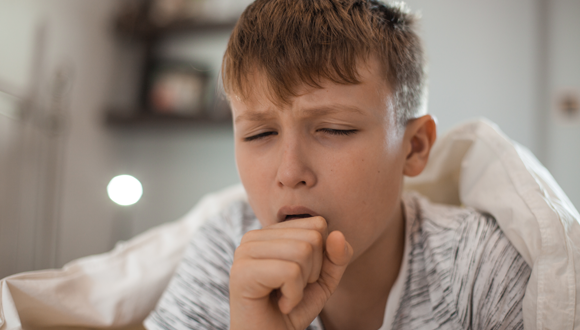Does your child have a cough they can’t shake? They may have walking pneumonia, a lingering lung infection that looks and feels like a cold. Usually uncommon in children, cases of walking pneumonia are surging across the U.S. These cases are especially widespread among young kids, according to the Centers for Disease Control and Prevention.
Our pediatric specialists are here to help them get back on the road to recovery.
Eberechi Nwaobasi-Iwuh, MD, division chief of pediatric hospital medicine for Goryeb Children's Hospital at Morristown Medical Center and a pediatric infectious disease doctor and hospitalist with Atlantic Health System, explains what walking pneumonia is and how to treat it.
What Is walking pneumonia?
Walking pneumonia, also called mycoplasma pneumonia or atypical pneumonia, is a milder form of pneumonia. It’s caused by viruses or an atypical (uncommon) bacteria called Mycoplasma pneumoniae. Unlike regular pneumonia, which can make you feel very ill, tired or feverish, walking pneumonia usually causes less severe symptoms.
“You can have walking pneumonia and still be relatively functional,” says Dr. Nwaobasi-Iwuh. “You may feel a little sick, but not so sick that you can’t participate in regular daily activities.”
Although you can catch walking pneumonia at any time of year, it’s more common in the fall and winter.
What are the symptoms of walking pneumonia?
The most common symptom of walking pneumonia is a persistent (nagging) cough that lasts longer than five days. Other walking pneumonia symptoms include:
- Body aches
- Chest pain or soreness
- Fatigue
- Low-grade fever
- Sore throat
In rare cases, your child may experience non-respiratory symptoms, such as:
- Encephalitis (brain inflammation)
- Mouth ulcerations (sores)
- Redness or peeling around the eyes
Is walking pneumonia contagious?
Yes, walking pneumonia is contagious. Because of its mild symptoms, it can easily spread without people’s knowledge.
“It’s spread by droplets, just like most respiratory illnesses like the cold or flu,” explains Dr. Nwaobasi-Iwuh. “You can catch mycoplasma pneumonia through coughs or touching contaminated surfaces.”
Symptoms may not appear for one to four weeks after contracting the illness. Walking pneumonia spreads because people who’ve been infected don’t realize they are sick.
“You’re contagious up until you start treatment,” Dr. Nwaobasi-Iwuh cautions. “Once you begin treatment, your rate of infectivity — or the likelihood that you will infect others — decreases steadily every day.”
When should I see my doctor?
Walking pneumonia can last several weeks, unlike the average cold or flu. Contact your doctor if your child:
- Has symptoms that last more than five to seven days.
- Has difficulty breathing.
- Is unable to eat or drink enough to stay hydrated.
“Infants and toddlers don’t always have the same reserves as older kids,” says Dr. Nwaobasi-Iwuh. “They’re going to get dehydrated a little faster. They may be more prone to respiratory difficulty. If their symptoms start mild but persistently worsen, it’s time to contact your pediatrician.”
If you suspect your child has walking pneumonia, don’t hesitate to call your doctor. The doctor can listen to their lungs, review symptoms and decide if further testing or treatment is needed.
How is walking pneumonia diagnosed and treated?
To determine if your child needs treatment, your doctor will conduct a physical exam and swab the nose and throat. Your doctor may also take a small blood sample to check for antibodies against the bacteria.
Doctors use a special class of antibiotics — called macrolide antibiotics — to treat walking pneumonia. Your doctor may prescribe a five-day course of medication to help you recover faster.
“Walking pneumonia can be self-limited, in that your body will take care of it, but you may feel sick for a week or two,” explains Dr. Nwaobasi-Iwuh. “If your symptoms keep you from functioning, it’s time to seek treatment.”
How can I prevent walking pneumonia?
The best way to prevent walking pneumonia is to practice good handwashing and keep your distance from people who are sick.
“If someone is coughing a lot or feeling fatigued, don’t necessarily attribute their symptoms to allergies,” Dr. Nwaobasi-Iwuh advises.
Between daycare, school and extracurricular activities, illnesses seem inevitable. If your child does catch mycoplasma pneumonia, our pediatric specialists at Atlantic Health System are here to help.
“In the grand scheme of bacterial infections, walking pneumonia is a very well-known and treatable illness,” assures Dr. Nwaobasi-Iwuh. “If your child gets it, there’s no reason to think they won’t get better.”
If your child is experiencing walking pneumonia symptoms, contact us today to schedule an appointment.












